Deck 4: Plate Tectonics
Question
Question
Question
Question
Question
Question
Question
Question
Question
Question
Question
Question
Question
Question
Question
Question
Question
Question
Question
Question
Question
Question
Question
Question
Question
Question
Question
Question
Question
Question
Question
Question
Question
Question
Question
Question
Question
Question
Question
Question
Question
Question
Question
Question
Question
Question
Question
Question
Question
Question
Question
Question
Question
Question
Question
Question
Question
Question
Question
Question
Question
Question
Question
Question

Unlock Deck
Sign up to unlock the cards in this deck!
Unlock Deck
Unlock Deck
1/64
Play
Full screen (f)
Deck 4: Plate Tectonics
1
What part of the process of science are "fit of the continents," matching fossils on different continents and similarities in structures that were used to develop the ideas about continental drift?
A) Hypotheses
B) Theories
C) Observations
A) Hypotheses
B) Theories
C) Observations
Observations
2
Which of the following images best represents the crust, mantle and core of Earth? 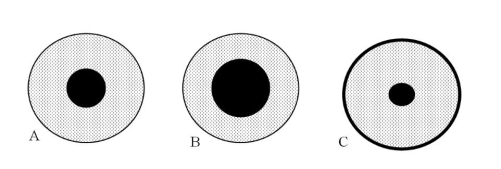
A) Diagram A
B) Diagram B
C) Diagram C

A) Diagram A
B) Diagram B
C) Diagram C
Diagram B
3
What happens to tectonic plates at a transform boundary?
A) They are formed.
B) They are recycled.
C) They are not formed or recycled.
A) They are formed.
B) They are recycled.
C) They are not formed or recycled.
They are not formed or recycled.
4
Use the map-view diagram of a group of tectonic plates to answer the question. Note: Not all features are shown for all boundaries.
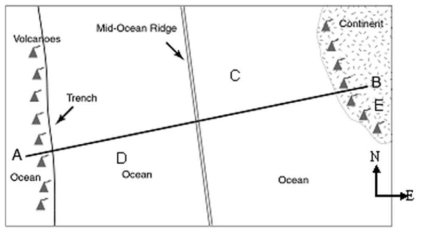
-How many tectonic plates are represented in this diagram?
A) 2
B) 3
C) 4
D) 5

-How many tectonic plates are represented in this diagram?
A) 2
B) 3
C) 4
D) 5

Unlock Deck
Unlock for access to all 64 flashcards in this deck.
Unlock Deck
k this deck
5
Use the map-view diagram of a group of tectonic plates to answer the question. Note: Not all features are shown for all boundaries.

-Which location has a volcanic island arc?
A) Near A
B) Near B
C) Near C

-Which location has a volcanic island arc?
A) Near A
B) Near B
C) Near C

Unlock Deck
Unlock for access to all 64 flashcards in this deck.
Unlock Deck
k this deck
6
Use the map-view diagram of a group of tectonic plates to answer the question. Note: Not all features are shown for all boundaries.

-Where do you predict there are deep earthquakes?
A) Below A
B) Below B
C) Below C
D) Below A and B
E) All of those locations.

-Where do you predict there are deep earthquakes?
A) Below A
B) Below B
C) Below C
D) Below A and B
E) All of those locations.

Unlock Deck
Unlock for access to all 64 flashcards in this deck.
Unlock Deck
k this deck
7
Use the map-view diagram of a group of tectonic plates to answer the question. Note: Not all features are shown for all boundaries.

-What is the relative direction of motion for points A and D?
A) Convergent
B) Divergent
C) Transform

-What is the relative direction of motion for points A and D?
A) Convergent
B) Divergent
C) Transform

Unlock Deck
Unlock for access to all 64 flashcards in this deck.
Unlock Deck
k this deck
8
Use the map-view diagram of a group of tectonic plates to answer the question. Note: Not all features are shown for all boundaries.

-What is the relative direction of motion for points C and D?
A) Convergent
B) Divergent
C) Transform

-What is the relative direction of motion for points C and D?
A) Convergent
B) Divergent
C) Transform

Unlock Deck
Unlock for access to all 64 flashcards in this deck.
Unlock Deck
k this deck
9
Use the map-view diagram of a group of tectonic plates to answer the question. Note: Not all features are shown for all boundaries.

-Which of the cross sectional diagrams shown below best illustrates the plate boundaries across the line A- B?
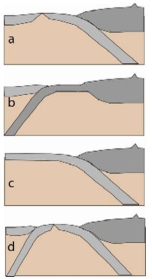
A) Diagram a
B) Diagram b
C) Diagram c
D) Diagram d

-Which of the cross sectional diagrams shown below best illustrates the plate boundaries across the line A- B?

A) Diagram a
B) Diagram b
C) Diagram c
D) Diagram d

Unlock Deck
Unlock for access to all 64 flashcards in this deck.
Unlock Deck
k this deck
10
Use the map-view diagram of a group of tectonic plates to answer the question. Note: Not all features are shown for all boundaries.

-Which graph best shows how the age of oceanic crust changes across a mid-ocean ridge?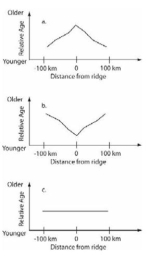
A) Graph a
B) Graph b
C) Graph c

-Which graph best shows how the age of oceanic crust changes across a mid-ocean ridge?

A) Graph a
B) Graph b
C) Graph c

Unlock Deck
Unlock for access to all 64 flashcards in this deck.
Unlock Deck
k this deck
11
Which graph best shows how the depth of oceanic crust changes across a mid-ocean ridge? 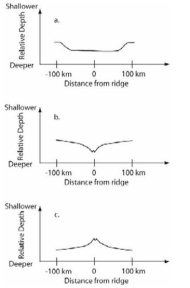
A) Graph a
B) Graph b
C) Graph c

A) Graph a
B) Graph b
C) Graph c

Unlock Deck
Unlock for access to all 64 flashcards in this deck.
Unlock Deck
k this deck
12
Use the following diagram to answer this question.

-Which of the images best represents the plate boundary between the Nazca and South American plates?
A) Diagram a
B) Diagram b
C) Diagram c
D) Diagram d

-Which of the images best represents the plate boundary between the Nazca and South American plates?
A) Diagram a
B) Diagram b
C) Diagram c
D) Diagram d

Unlock Deck
Unlock for access to all 64 flashcards in this deck.
Unlock Deck
k this deck
13
Use the following diagram to answer this question.

-Which of the images best represents the plate boundary between the South American and African plates?
A) Diagram a
B) Diagram b
C) Diagram c
D) Diagram d

-Which of the images best represents the plate boundary between the South American and African plates?
A) Diagram a
B) Diagram b
C) Diagram c
D) Diagram d

Unlock Deck
Unlock for access to all 64 flashcards in this deck.
Unlock Deck
k this deck
14
Use the following diagram to answer this question.

-Which of the images above best represents the plate boundary between the North American and Pacific plates along the San Andreas Fault?
A) Diagram a
B) Diagram b
C) Diagram c
D) Diagram d

-Which of the images above best represents the plate boundary between the North American and Pacific plates along the San Andreas Fault?
A) Diagram a
B) Diagram b
C) Diagram c
D) Diagram d

Unlock Deck
Unlock for access to all 64 flashcards in this deck.
Unlock Deck
k this deck
15
Use the following diagram to answer this question.

-Which of the images would be potential sites for both active volcanoes and deep earthquakes?
A) Diagram a and b
B) Diagram b and c
C) Diagram c and d
D) Diagram a, b, c, and d

-Which of the images would be potential sites for both active volcanoes and deep earthquakes?
A) Diagram a and b
B) Diagram b and c
C) Diagram c and d
D) Diagram a, b, c, and d

Unlock Deck
Unlock for access to all 64 flashcards in this deck.
Unlock Deck
k this deck
16
The magnetic North Pole migrated northward from 1902-2002.
How did magnetic inclination readings in the continental United States change during that period?
A) Inclination became steeper (moved towards vertical)
B) Inclination became less steep (moved towards horizontal)
C) Inclination remained constant
How did magnetic inclination readings in the continental United States change during that period?
A) Inclination became steeper (moved towards vertical)
B) Inclination became less steep (moved towards horizontal)
C) Inclination remained constant

Unlock Deck
Unlock for access to all 64 flashcards in this deck.
Unlock Deck
k this deck
17

Examine the map of the plate boundaries and answer this question.
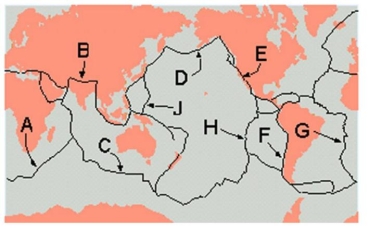
-Oceanic ridges are present at all of the following locations.
A) A,C,H,G
B) D,J,E
C) F,H,J,D
D) G only

Unlock Deck
Unlock for access to all 64 flashcards in this deck.
Unlock Deck
k this deck
18

Examine the map of the plate boundaries and answer this question.

-Oceanic trenches are present at all of the following locations.
A) A,C,H
B) H,J,E
C) F,J,D
D) B,E,C

Unlock Deck
Unlock for access to all 64 flashcards in this deck.
Unlock Deck
k this deck
19

Examine the map of the plate boundaries and answer this question.

-New oceanic floor is being created at ____.
A) J
B) B
C) C
D) F

Unlock Deck
Unlock for access to all 64 flashcards in this deck.
Unlock Deck
k this deck
20

Examine the map of the plate boundaries and answer this question.

-A major transform plate boundary is present at ____.
A) A
B) B
C) C
D) D
E) E

Unlock Deck
Unlock for access to all 64 flashcards in this deck.
Unlock Deck
k this deck
21

Examine the map of the plate boundaries and answer this question.

-A subduction zone is located below ____.
A) H
B) G
C) C
D) D

Unlock Deck
Unlock for access to all 64 flashcards in this deck.
Unlock Deck
k this deck
22

Examine the map of the plate boundaries and answer this question.

-Oceanic lithosphere is being recycled at ___.
A) H
B) G
C) C
D) D

Unlock Deck
Unlock for access to all 64 flashcards in this deck.
Unlock Deck
k this deck
23
Complete the concept map by selecting the best response for the question numbers listed.
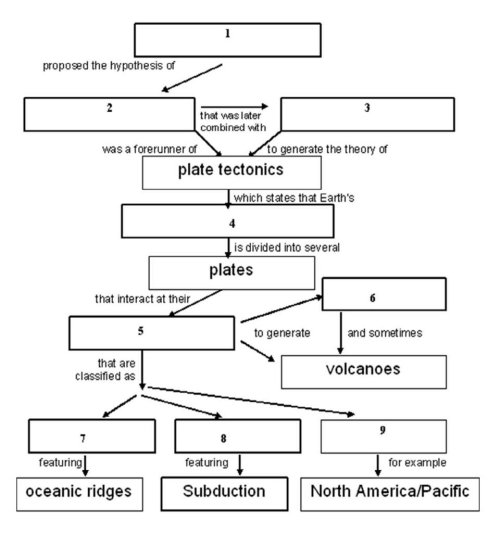
-Complete the concept map by selecting the best response for question number 1.
A) Hutton
B) Wegener
C) Darwin

-Complete the concept map by selecting the best response for question number 1.
A) Hutton
B) Wegener
C) Darwin

Unlock Deck
Unlock for access to all 64 flashcards in this deck.
Unlock Deck
k this deck
24
Complete the concept map by selecting the best response for the question numbers listed.

-Complete the concept map by selecting the best response for question number 2.
A) Pangaea
B) Sea-floor spreading
C) Continental drift

-Complete the concept map by selecting the best response for question number 2.
A) Pangaea
B) Sea-floor spreading
C) Continental drift

Unlock Deck
Unlock for access to all 64 flashcards in this deck.
Unlock Deck
k this deck
25
Complete the concept map by selecting the best response for the question numbers listed.

-Complete the concept map by selecting the best response for question number 3.
A) Pangaea
B) Sea-floor spreading
C) Continental drift

-Complete the concept map by selecting the best response for question number 3.
A) Pangaea
B) Sea-floor spreading
C) Continental drift

Unlock Deck
Unlock for access to all 64 flashcards in this deck.
Unlock Deck
k this deck
26
Complete the concept map by selecting the best response for the question numbers listed.

-Complete the concept map by selecting the best response for question number 4.
A) Lithosphere
B) Crust
C) Mantle

-Complete the concept map by selecting the best response for question number 4.
A) Lithosphere
B) Crust
C) Mantle

Unlock Deck
Unlock for access to all 64 flashcards in this deck.
Unlock Deck
k this deck
27
Complete the concept map by selecting the best response for the question numbers listed.

-Complete the concept map by selecting the best response for question number 5.
A) Hot spots
B) Centers
C) Boundaries

-Complete the concept map by selecting the best response for question number 5.
A) Hot spots
B) Centers
C) Boundaries

Unlock Deck
Unlock for access to all 64 flashcards in this deck.
Unlock Deck
k this deck
28
Complete the concept map by selecting the best response for the question numbers listed.

-Complete the concept map by selecting the best response for question number 6.
A) Earthquakes
B) Hot spots
C) Basins

-Complete the concept map by selecting the best response for question number 6.
A) Earthquakes
B) Hot spots
C) Basins

Unlock Deck
Unlock for access to all 64 flashcards in this deck.
Unlock Deck
k this deck
29
Complete the concept map by selecting the best response for the question numbers listed.

-Complete the concept map by selecting the best response for question number 7.
A) Convergent
B) Divergent
C) Transform

-Complete the concept map by selecting the best response for question number 7.
A) Convergent
B) Divergent
C) Transform

Unlock Deck
Unlock for access to all 64 flashcards in this deck.
Unlock Deck
k this deck
30
Complete the concept map by selecting the best response for the question numbers listed.

-Complete the concept map by selecting the best response for question number 8.
A) Convergent
B) Divergent
C) Transform

-Complete the concept map by selecting the best response for question number 8.
A) Convergent
B) Divergent
C) Transform

Unlock Deck
Unlock for access to all 64 flashcards in this deck.
Unlock Deck
k this deck
31
Complete the concept map by selecting the best response for the question numbers listed.

-Complete the concept map by selecting the best response for question number 9.
A) Convergent
B) Divergent
C) Transform

-Complete the concept map by selecting the best response for question number 9.
A) Convergent
B) Divergent
C) Transform

Unlock Deck
Unlock for access to all 64 flashcards in this deck.
Unlock Deck
k this deck
32
What was the super-continent landmass proposed by the person whom formulated the idea of continental drift?
A) Pangaea
B) Rodinia
C) Eurasia
A) Pangaea
B) Rodinia
C) Eurasia

Unlock Deck
Unlock for access to all 64 flashcards in this deck.
Unlock Deck
k this deck
33
Where are the youngest rocks found on the seafloor?
A) Trenches
B) Mid-ocean ridges
C) Along coastlines
A) Trenches
B) Mid-ocean ridges
C) Along coastlines

Unlock Deck
Unlock for access to all 64 flashcards in this deck.
Unlock Deck
k this deck
34
What happens to the age of seafloor rocks moving away from a mid-ocean ridge?
A) The rocks get younger.
B) The rocks get older.
C) The rock ages do not change.
A) The rocks get younger.
B) The rocks get older.
C) The rock ages do not change.

Unlock Deck
Unlock for access to all 64 flashcards in this deck.
Unlock Deck
k this deck
35
What happens to the depth of the seafloor moving away from a mid-ocean ridge?
A) The seafloor deepens adjacent to the ridge.
B) The seafloor shallows adjacent to the ridge.
C) The seafloor depth does not change adjacent to the ridge.
A) The seafloor deepens adjacent to the ridge.
B) The seafloor shallows adjacent to the ridge.
C) The seafloor depth does not change adjacent to the ridge.

Unlock Deck
Unlock for access to all 64 flashcards in this deck.
Unlock Deck
k this deck
36
Which two ideas were combined to form the theory of plate tectonics?
A) Continental drift and the Big Bang
B) Continental drift and the scientific process
C) Continental drift and seafloor spreading
A) Continental drift and the Big Bang
B) Continental drift and the scientific process
C) Continental drift and seafloor spreading

Unlock Deck
Unlock for access to all 64 flashcards in this deck.
Unlock Deck
k this deck
37
Where is new seafloor generated?
A) Trenches
B) Mid-ocean ridges
C) Along coastlines
A) Trenches
B) Mid-ocean ridges
C) Along coastlines

Unlock Deck
Unlock for access to all 64 flashcards in this deck.
Unlock Deck
k this deck
38
Where is seafloor returned to the mantle?
A) Trenches
B) Mid-ocean ridges
C) Along coastlines
A) Trenches
B) Mid-ocean ridges
C) Along coastlines

Unlock Deck
Unlock for access to all 64 flashcards in this deck.
Unlock Deck
k this deck
39
The speed of plate motion is approximately
A) 1-10 cm/yr.
B) 1-10 m/yr.
C) 1-10 km/yr.
A) 1-10 cm/yr.
B) 1-10 m/yr.
C) 1-10 km/yr.

Unlock Deck
Unlock for access to all 64 flashcards in this deck.
Unlock Deck
k this deck
40
Approximately how old is the oldest oceanic crust?
A) 2 billion years
B) 200 million years
C) 20 million years
D) 2 million
A) 2 billion years
B) 200 million years
C) 20 million years
D) 2 million

Unlock Deck
Unlock for access to all 64 flashcards in this deck.
Unlock Deck
k this deck
41
What is the proper order of Earth's compositional layers from the interior to the surface?
A) Crust, mantle, core
B) Mantle, core, crust
C) Core, mantle, crust
A) Crust, mantle, core
B) Mantle, core, crust
C) Core, mantle, crust

Unlock Deck
Unlock for access to all 64 flashcards in this deck.
Unlock Deck
k this deck
42
What happens to the age of the Hawaiian Islands moving away from the hot spot?
A) They get older
B) They get younger
C) The age does not change
A) They get older
B) They get younger
C) The age does not change

Unlock Deck
Unlock for access to all 64 flashcards in this deck.
Unlock Deck
k this deck
43
What technology allows scientists to precisely measure plate motions?
A) Global seismometers
B) Global satellite imagery
C) Global positioning system
A) Global seismometers
B) Global satellite imagery
C) Global positioning system

Unlock Deck
Unlock for access to all 64 flashcards in this deck.
Unlock Deck
k this deck
44
Which type of plate motion is characteristic of a convergent boundary?
A) Plates move away from one another.
B) Plates move toward one another.
C) Plates move past one another.
A) Plates move away from one another.
B) Plates move toward one another.
C) Plates move past one another.

Unlock Deck
Unlock for access to all 64 flashcards in this deck.
Unlock Deck
k this deck
45
Which type of plate motion is characteristic of a divergent boundary?
A) Plates move away from one another.
B) Plates move toward one another.
C) Plates move past one another.
A) Plates move away from one another.
B) Plates move toward one another.
C) Plates move past one another.

Unlock Deck
Unlock for access to all 64 flashcards in this deck.
Unlock Deck
k this deck
46
Which type of plate motion is characteristic of a transform boundary?
A) Plates move away from one another.
B) Plates move toward one another.
C) Plates move past one another.
A) Plates move away from one another.
B) Plates move toward one another.
C) Plates move past one another.

Unlock Deck
Unlock for access to all 64 flashcards in this deck.
Unlock Deck
k this deck
47
What happens when an oceanic plate collides with a continental plate?
A) The continental plate is subducted.
B) The oceanic plate is subducted.
C) The oldest plate is subducted.
A) The continental plate is subducted.
B) The oceanic plate is subducted.
C) The oldest plate is subducted.

Unlock Deck
Unlock for access to all 64 flashcards in this deck.
Unlock Deck
k this deck
48
Where is heat flow the greatest?
A) Near oceanic ridges
B) Near oceanic trenches
C) Near transform boundaries
A) Near oceanic ridges
B) Near oceanic trenches
C) Near transform boundaries

Unlock Deck
Unlock for access to all 64 flashcards in this deck.
Unlock Deck
k this deck
49
Scientists in the early 20th century immediately accepted the idea of continental drift.

Unlock Deck
Unlock for access to all 64 flashcards in this deck.
Unlock Deck
k this deck
50
Mid-ocean ridges are a source of volcanic activity.

Unlock Deck
Unlock for access to all 64 flashcards in this deck.
Unlock Deck
k this deck
51
Earthquakes get shallower in the direction of subduction.

Unlock Deck
Unlock for access to all 64 flashcards in this deck.
Unlock Deck
k this deck
52
The polarity of Earth's magnetic poles has reversed in the past.

Unlock Deck
Unlock for access to all 64 flashcards in this deck.
Unlock Deck
k this deck
53
The magnetic field of the earth is vertical at the equator and horizontal at the poles.

Unlock Deck
Unlock for access to all 64 flashcards in this deck.
Unlock Deck
k this deck
54
Plate tectonics explains past processes that shaped the Earth but not present-day processes.

Unlock Deck
Unlock for access to all 64 flashcards in this deck.
Unlock Deck
k this deck
55
Subduction zones are found near passive margins.

Unlock Deck
Unlock for access to all 64 flashcards in this deck.
Unlock Deck
k this deck
56
The Hawaiian Islands are located above a subduction zone.

Unlock Deck
Unlock for access to all 64 flashcards in this deck.
Unlock Deck
k this deck
57
Plates are consumed at oceanic ridges.

Unlock Deck
Unlock for access to all 64 flashcards in this deck.
Unlock Deck
k this deck
58
Earthquakes are most frequent along convergent plate boundaries.

Unlock Deck
Unlock for access to all 64 flashcards in this deck.
Unlock Deck
k this deck
59
The oldest oceanic lithosphere in the Atlantic Ocean is located along the continental margins.

Unlock Deck
Unlock for access to all 64 flashcards in this deck.
Unlock Deck
k this deck
60
A deep ocean trench is present along the east coast of South America.

Unlock Deck
Unlock for access to all 64 flashcards in this deck.
Unlock Deck
k this deck
61
The east coast of the United States is a passive margin.

Unlock Deck
Unlock for access to all 64 flashcards in this deck.
Unlock Deck
k this deck
62
Volcanoes only form above hot spots.

Unlock Deck
Unlock for access to all 64 flashcards in this deck.
Unlock Deck
k this deck
63
Earth's magnetic poles are in the same location as the planet's geographic poles.

Unlock Deck
Unlock for access to all 64 flashcards in this deck.
Unlock Deck
k this deck
64
Earth's magnetic poles today are considered normal polarity.

Unlock Deck
Unlock for access to all 64 flashcards in this deck.
Unlock Deck
k this deck


